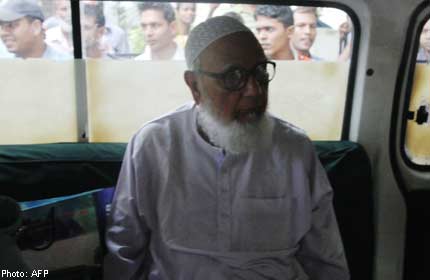
DHAKA - Bangladesh's war crimes tribunal convicted and sentenced a former Islamist party leader to life imprisonment on Monday, in the fifth such conviction since January, as violence broke out between police and his supporters across the country.
Bangladesh has been hit in recent months by a wave of violent protests related to the war crime convictions and the unrest presents a thorny law and order challenge to the government, which is gearing up for polls early next year.
Ghulam Azam, 91, the former head of the Jamaat-e-Islami party, was found guilty on charges of planning, conspiracy, incitement and complicity to commit genocide and crimes against humanity during a 1971 war to break away from Pakistan, lawyers and tribunal officials said.
"All charges have been proved but the death sentence has not been given, considering his age," state prosecutor Syed Haider Ali told Reuters. Azam has received a 90-year jail term.
Shops and businesses closed in a day-long strike called by the Jamaat, the main Islamist party in Bangladesh and a key part of an opposition coalition, to protest against the verdict.
Party activists skirmished with police in Dhaka, the capital, and elsewhere, including the port city of Chittagong, and Rajshahi, Comilla, Bagerhat and Barishal.
The tribunal proceedings have angered Islamists and the main opposition Bangladesh Nationalist Party (BNP), who call them a politically-motivated bid to persecute the leadership of Jamaat. The government has denied the charges.
The wheelchair-bound Azam, who is widely believed to be the mastermind behind abuses during the 1971 war, looked calm but made a feeble protest when the judge read the verdict, lawyers said.

"We did not get justice. We will appeal against the verdict," defence lawyer Saifur Rahman told reporters.
The tribunal has so far convicted three other Jamaat leaders to death and sentenced one to life.
Six more Jamaat leaders and two from the BNP are also on trial at the war crimes tribunal, which, unlike other war crime courts, is not endorsed by the United Nations. The New York-based Human Rights Watch group has said the tribunal's procedures fall short of international standards.
In 2010, Prime Minister Sheikh Hasina's government launched an inquiry into atrocities committed during the war.
Bangladesh became part of Pakistan at the end of British colonial rule in 1947. The independence war claimed about 3 million lives. Some factions in Bangladesh opposed the break with Pakistan, including Jamaat. Its leaders have denied involvement in abuses.
More than 100 people have been killed in protests over tribunal verdicts since January.

